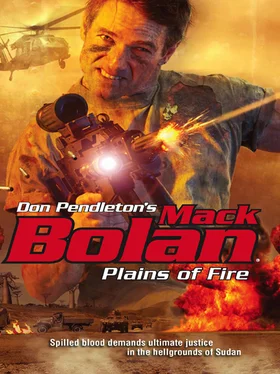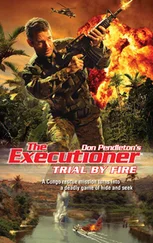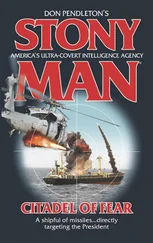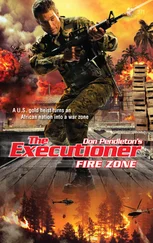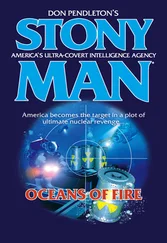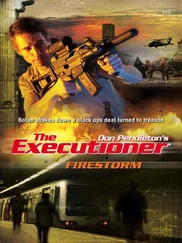“We’re rousing the civilians. Luckily, they’re early risers,” Tanku said. “This section of the camp is already filing out through the fence.”
Okuba nodded. Tanku could tell that his fellow soldier wanted to bolt from his position, but his duty kept him on station. It wouldn’t be much of a consolation when nearly ten inches of enemy warhead dropped out of the sky, delivering the punch of dozens of kilograms of high explosives. The lieutenant looked toward the descending rockets when he saw one burst into a blossom of smoky tentacles that stretched across the sky over the refugee camp.
“Gas attack!” Tanku bellowed at the top of his lungs. “Gas masks!”
Okuba whirled back to the microphone, updating the EEF’s officers about the changing nature of the rocket assault. Other rockets began detonating as they dropped within a certain height, splitting the air with sharp cracks that were unnervingly devoid of the light of flame.
That was the surest indication on Tanku’s part that they were dealing with some form of chemical assault. The Ethiopian’s face twisted into a rictus of anger as he glanced toward Okuba.
“Put your gas mask on!” Tanku snapped.
“You don’t have one!” Okuba replied. “They don’t have masks outside!”
“Just do it!” Tanku ordered.
Okuba did so. His gas mask was in the bottom drawer of his desk.
Tanku cursed himself for not bringing his mask with him, but he knew that none of the refugees would have more than a wet towel to protect their lungs from whichever chemical scourge Bitturumba’s Thunder Lions were dropping on their heads.
With the introduction of weapons of mass destruction, Tanku idly wondered if there was a possibility that the United States would take a more urgent role in the Sudanese conflict. After all, it was the fear of Muslims with chemical weaponry that started the Iraq war, and that had been spurned by far less spurious evidence than an actual chemical attack such as here.
Tanku steeled himself, waiting for the first symptoms of poison or nerve agent to appear. There wasn’t even the scent of burned almonds, indicative of cyanide gas, in the air. He knew that nerve agents were odorless and flavorless, but once they touched him, he would begin twitching uncontrollably, frothing at the mouth as he felt his insides liquefy. Unfortunately, a quick glance to Okuba reminded him that the gas masks the Ethiopians wore were thin, almost useless protection against the horrors of weapons like Sarin or Tabur.
He waited for a full minute, breathing shallowly, as if the lowered respiration would somehow protect him from the ravages of chemical weapons that could be absorbed through the skin. He looked at his deep dark forearms, imagining the colorful globules of nerve agent molecules drifting and wafting down to his skin, turning his nearly black forearms gray and diseased as they landed, penetrating living flesh to invade his bloodstream.
“Alem?” Okuba asked, his voice muffled by the gas mask.
“Keep it on,” Tanku grated. His shoulders were knotted so tight that he thought that his tensed muscles would snap his clavicle like a twig.
“I don’t think anything was released into the air,” Okuba stated. “There isn’t any reaction anywhere in the camp.”
Tanku glanced around. His fellow Ethiopian soldiers were radioing in and he could hear their voices over Okuba’s radio. They were reporting a complete lack of casualties.
“I don’t even see any harm from shrapnel released by the air-bursting rockets,” one EEF trooper announced.
Tanku’s shoulders loosened and he took a deep breath, releasing it in a sigh of relief.
“Maybe they wanted to show us that they had the means to release bio or chem agents into the air,” Okuba noted, pulling off his mask. “To let us know that we don’t have anything to stop them.”
“You think they’d really bring down the ire of the Americans?” Tanku asked. “Saddam had a chemical weapons program, at least before he shipped it off to Syria before the invasion.”
Okuba shook his head. “Iraq is full of oil. This is the Sudan. What would the Americans care about here?”
“So Bitturumba isn’t the least bit concerned that he’s opened a can of worms,” Tanku grumbled.
“We’re on our own. I can’t think of a single white man who would come over here, roll up his sleeves and fight for us,” Okuba growled.
ALEM TANKU DIDN’T FEEL a thing. He remained healthy and unaffected, even as every one of his breaths sucked down dozens of airborne viral spores, parachuting gently to ground level on their long, slender cilia. The viral organisms rode the wind and found a welcome home in the bronchial sacs lining the Ethiopian’s lungs. Billions of their brethren were finding root in the respiratory systems of hundreds of EEF soldiers and Sudanese refugees.
Once the instantaneous effects of poison gas and nerve agents seemed missing from the aerial bombardment equation, the sighs of relief only served to make it easier for the Ebola mutations to ride currents into warm places where they could latch on to permeable cells and begin to feed. Within an hour, fully gorged on genetic material, the virus spores began to propagate, multiplying. One cell became two, which then became four. Some of the newly birthed spores spread their cilia and were blown out, exhaled into the world. Normally, the hemorrhagic fever spores would have been in the bloodstream and sputum of a larger organism, such as a tick, mosquito or the mammals they fed upon. These spores, however, had been redesigned. Their viral cellular membranes were thicker, allowing them to survive outside a liquid suspension. They no longer required transfer via the mixing of bodily fluids, as when a lesser animal would bite a human.
They could take to the air, riding the exhalations of the hosts where they first bred.
That’s how Tanku infected Okuba as they clinked their metal coffee cups in a toast to surviving a supposedly inept assault by Bitturumba.
It was only after Tanku began running a fever that the sighs of relief were suspected to be death sentences. His stomach felt as if a brick had been laid inside of it, and any thought of lunch and dinner repulsed him. Half of the refugee camp had assembled for lunch, but only a few people were willing to sit for dinner, possessing an appetite. Tanku’s limbs and muscles were knotted again, but this time involuntarily. Aches ripped through his frame.
An hour after sunset, when Alem Tanku was convulsing and trembling, tears of blood rolling down his cheeks, rivulets of crimson mixed in with the mucus pouring from his nose, the first of the EEF medics developed a fever. Those who hadn’t worn simple paper masks when dealing with the victims of the hemorrhagic fever outbreak were coming down with symptoms their patients had reported much earlier. Those medical personnel who operated under infectious disease precautions were unharmed.
At dawn, the viral spores had turned Tanku’s lesser blood vessels, the fine, slender capillaries, into sieves. His tears and his sweat were crimson, filled with ruptured red cells, no longer capable of transporting oxygen to the rest of his body.
By noon, Tanku was the first to die from what the Ethiopian Expeditionary Force had named Ebola Thunder, in honor of the madman who had unleashed it upon the world.
Unfortunately he wasn’t the last, as in the next second a dozen refugees vomited the bloody slush that used to be their lungs and expired, as well.
By evening, thirteen hundred corpses were being shoveled into the bottom of a grave dug up by bulldozers. The World Health Organization resources sent to respond to an unprecedented outbreak of a new form of Ebola arrived just in time to see all but a handful of bodies turned to ash by concentrated streams of burning gasoline.
Читать дальше
